Looking for a WordPress alternative? Here are all the best CMS that you can use instead of WordPress.
WordPress as a Content Management System has many advantages going for it. It is versatile, customizable, and compatible with thousands of themes and plugins. It has a searchable database and a vast community that supports it. WordPress is constantly updated, is the most popular Content Management System, with 44% of all websites using WordPress, and shows no signs of slowing down.
However, WordPress may be a bit of an overkill for some websites. A simple blog may need very limited functions and using WordPress for such blogs is unnecessary. WordPress can be installed and used even by novices, and WordPress’s 5-minute installation will tempt many here. But, at some stage, you will feel that some technical knowledge can help you get far with WordPress. You can customize WordPress a great deal, but to do so, you will need some coding knowledge or a little professional help.
WordPress is not the only CMS out there. Many more are beginning to mark this scene; some have been around for a few years.
One alternative to traditional Content Management Systems is an online website builder. This can work quite well for smaller projects. As everything is online, it can be accessed from anywhere and a team can work on it simultaneously.
What favors an online website builder is that you don’t need to purchase or install software locally. The CMS is located in the server of the CMS provider and a user can access it using any web browser. As the same service provider provides CMS and hosting, there will be no incompatibility. To top it all, there are many free and comprehensive packages available.
With offline builders, you must download and install the software on your computer. In this case, you will not be removed from your website and are not entirely dependent on your provider.
The advantage of these website builders is that the website design and the content are cleanly separated which means that the website design can be modified without affecting content. This separation also makes it easier for the website to be found by a search engine.
WordPress has many alternatives, but remember it is not a one-size-fits-all situation. Each of these alternatives has pros and cons; some may suit a particular type of website more than others. Many of these alternatives are not as versatile or as customizable as WordPress. But some offer a Do-it-Yourself drag and drop approach that is much easier to use and needs no professional help. They offer great customer support too.
Who should look for WordPress alternatives?
If you…
- Do not want to be bogged down with technicalities such as creating a database,
- Want free hosting (many providers throw in at least a custom subdomain free hosting),
- Looking for a web presence rather than a comprehensive blogging platform,
Then look at alternatives to WordPress. If you want to be hands-on, but at the same time do not want to use code, read further to find out which should be your choice of CMS.
Developers willing to wade through code or utilize the particular features offered by certain CMS can also pick their choice of CMS.
Best WordPress Alternatives
1. Wix

Wix offers free CMS combined with a hosting platform. It is not open source. With Wix you can select from a template from among the 500 available and customize your website. Your website is built visually as you drag and drop elements with Wix. Over 10 million websites use Wix.
Wix gets frequent and regular updates to keep up with the latest trends. There are over 200 apps that will let you add to your functions. Wix is shop friendly and you can have a custom domain name with the premium packages. Packages start at $122 per month (will display Wix ads) and go up to $485 per month.
While Wix is good for starting a website, you will not have control over it, as Wix also does hosting. And if you want to customize as you scale up, you may find that customization options are limited and third party plugins cannot be added. Wix is continuously adding to its extensions, and as they come from the same developer, you will find that they are entirely compatible. Updates are done automatically with Wix, and so there will be no maintenance work to be carried out.
Here are some awesome websites built using Wix.
2. Drupal (Open Source)
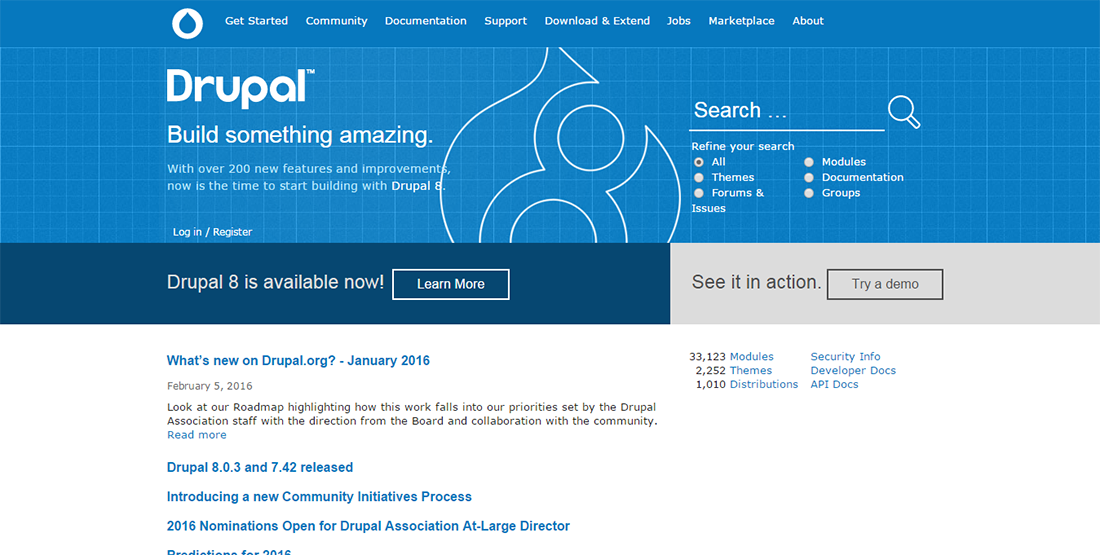
With nearly 100,000 users, Drupal is the most popular CMS behind WordPress. Larger organizations that have access to professional technical resources mostly use Drupal.
Drupal is fast loading, open source and highly scalable. It is reliable, highly secure and content can be added and managed easily. The presentation can be varied with themes and functionality can be extended with add-ons.
Drupal is free, but you will have to find your web host. With a single installation, you can manage multiple sites. It is multilingual.
Drupal is a great CMS, but it is much more technical than WordPress, and newbies should not attempt to build a site with Drupal. It is a good software to build a great looking website with advanced features, but needs technical competence to install and operate.
3. Joomla (Open Source)

In comparison with WordPress and Drupal, Joomla is neither here nor there. It brings many of the advantages of Drupal, without being too technical.
Joomla is multilingual, extensible and allows front-end editing. It boasts over 50 million downloads. It is perfect for content heavy sites and sites that need efficient content management.
Joomla is free and open source. It can run any website — a small store or a large government website. Advanced categorization of content and advanced search is possible. User management, user groups and contact management are features that can best even WordPress. Some features are inbuilt with Joomla, while you would have to add a plugin with WordPress to get the same functionality. But you must pay for most of the themes and plugins that Joomla offers.
4. Squarespace

With SquareSpace a user will get a website builder, a blogging platform and a hosting service. You would need to pick a template and you can customize this to a certain extent. The templates are modern and you can use multiple templates in a website. Squarespace is not open source, but that hasn’t stopped them from reaching 3 million active users.
The design templates from Squarespace are gorgeous and fit beautifully on mobile devices. Load times are fast as SquareSpace uses Content Delivery Network across geographies to host content. The developers fully integrated SquareSpace with eCommerce, and you can quickly set up an online store with Squarespace. You get free custom subdomain with some packages and a custom domain with higher-priced packages.
Squarespace is a paid service that starts at $5 per month. You can also opt for a 14-day free trial.
Squarespace is good for portfolio, restaurant or wedding sites- sites that need impressive visuals. While Squarespace does offer a limited amount of customization, you may find it frustrating if the feature you’re looking for is not included. Unlike in WordPress, you can’t change its basic features, where you can change pretty much anything.
Squarespace is for you if you want to set up a good-looking website on your own, without spending too many hours developing or troubleshooting its technology. All updates are fully tested and added to your site automatically, so you do not have a thing to do with maintenance. We recently created a detailed list of great websites using Squarespace.
5. TYPO3
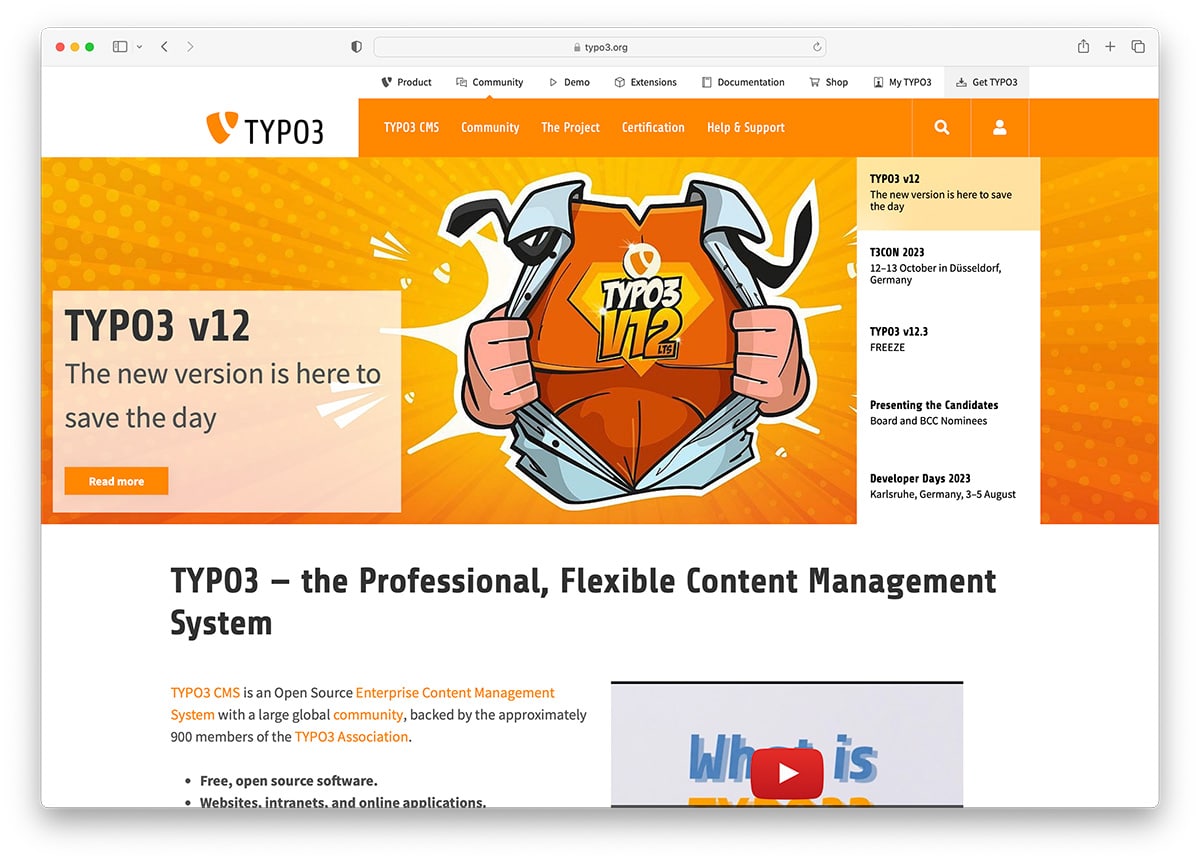
TYPO3 is another CMS that is popular with large organizations and corporates. It is free, open source and you can run any website with TYPO without using any code. It can also be extended with many functions without using code, simply using the 6000 freely available extensions.
Editors will love this CMS as it has front-end editing capability using integrated image processing, copy-paste functions, thumbnail generation, and various text and media elements. It is highly scalable, multilingual, and assists workflow management.
You can manage and distribute content across multiple websites from the backend of a single installation. So TYPO suits distribution websites, multiple microsites, and product sites.
6. Weebly

If you want to start blogging in a small way, Weebly should be your pick. It is a good choice if you’ve set your site for only one purpose, a portfolio. But if customization or adding to your subscription list is a big deal, skip this one.
You can pick your theme from the theme gallery and build your website by dragging and dropping images and text. You get access to the design codes in case you want to tweak your website here and there. Start an e-Commerce store that can manage shipping and tax, discount, and coupons. You can create and edit your website from any mobile device, so you can always stay in touch with your customers. Hosting is free, and Weebly counts over 30 million users.
Moreover, Weebly offers a free option that will suit students or hobbyists. But for every other kind of use you will have to subscribe to their packages- Basic at $8 per month, Pro at $12 per month and Business at $25 per month. All packages come with one-year free domain. With the free option, you get a custom subdomain.
7. Ghost (Blog CMS)
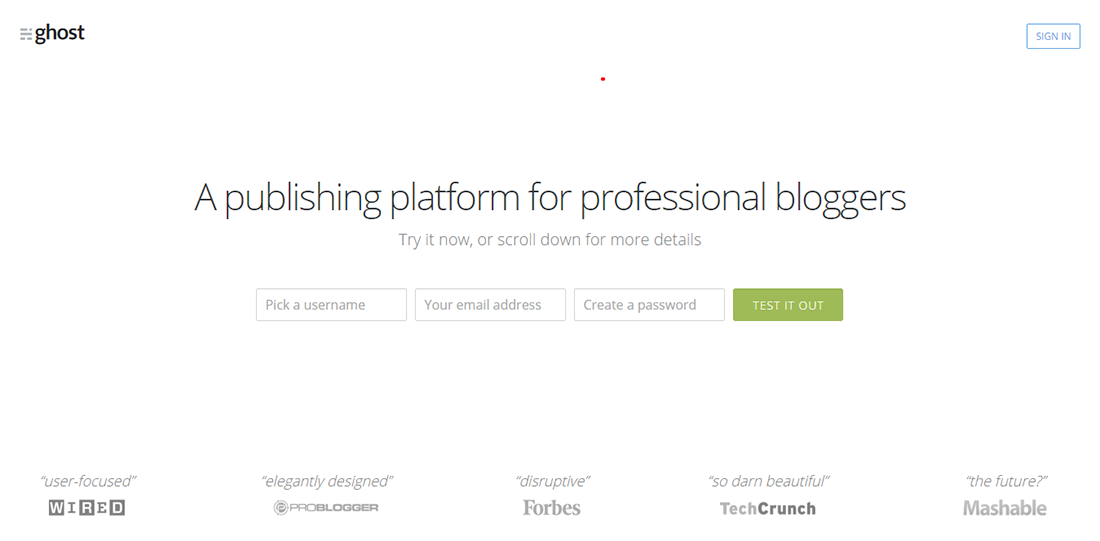
Ghost is starting to do what WordPress intended- simply being a blogging platform. It is not a complete CMS and aims to be an excellent option for blogging. You can suit it best for full-scale newspapers and individual blogs. About 47,981 live websites use Ghost.
Ghost is much faster than WordPress as it uses Node.js. But this can also be a drawback as Node.js is unavailable with many web hosts, narrowing your hosting options. The UI allows distraction-free writing, with no menus or settings bothering you. The developers split the editor, with text editing on the left and visual on the right. This enables you to view and format your work even as you write. The text editor uses Markdown syntax, meaning you do not have to deal with HTML. It enables multi-user usage and you can also manage your workflow.
Ghost was created as a WordPress alternative that could take over the entire market. But the enthusiasm quickly dried up and it is now a good blog platform with a small market share compared to WordPress.
Ghost pricing
Ghost offers a free version that you can download and install. You have access to source code and community support. Paid packages with added features, range from $8 per month to $200 per month. You can also try the premium packages free for 14 days.
8. Jekyll
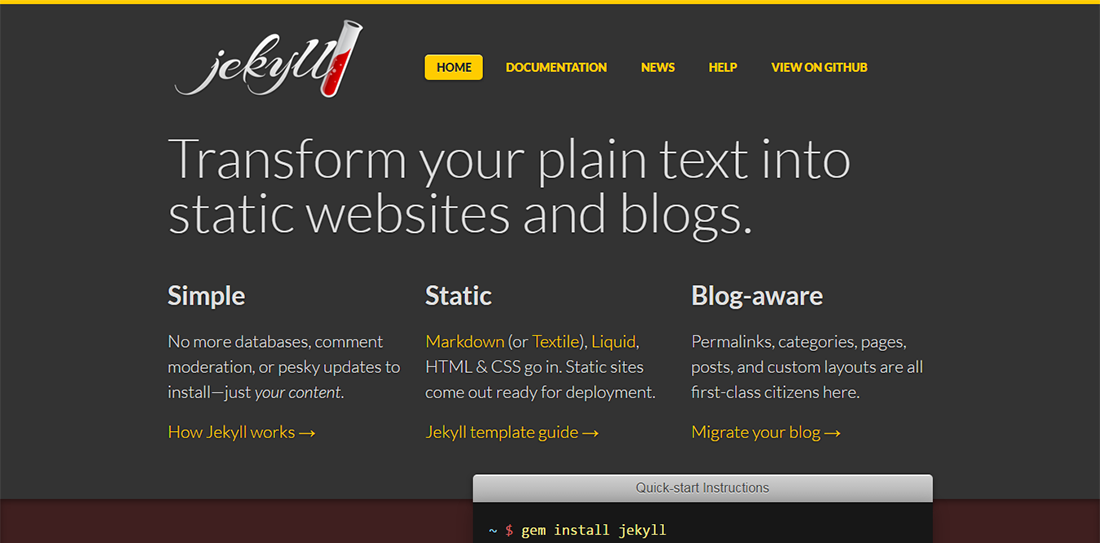
Jekyll may be the perfect solution for a truly fast loading publishing platform with free hosting. What’s the catch here? Code – enough of code to bracket this as a preferred option for developers. Those who prefer to work with code rather than fiddle about in the UI should try Jekyll.
Jekyll takes your content, makes up Markdown and Liquid Templates, and converts it into plain HTML static documents. This content is now ready to serve and presented by the server. It is a static site generator, converting your text files into HTML pages. Free hosting is available on GitHub pages. Jekyll can handle a huge traffic volume even from a very limited server.
9. Jimdo
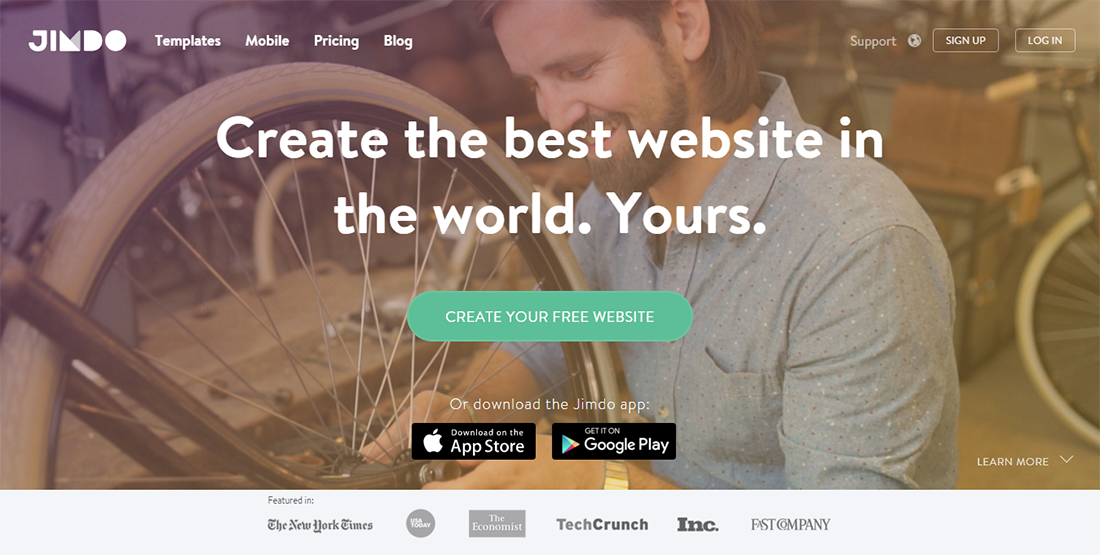
More than 15 million websites around the world use Jimdo. Jimdo offers a free basic version with which you will also get a custom subdomain. The Pro version, billed annually at $416.67 per month, gets you a custom domain and a basic online store. Jimdo Business at $1250 per month, billed annually, will fetch you 2 custom domains, priority support and a complete online store. You can try the paid versions for free for 30 days.
To set up Jimdo, you can pick a template and customize it. You can change it about a lot as well without losing content. Without doing anything much, you can also use it on mobiles. Setting up an online store with Jimdo is easy and its personalized support has earned it a loyal fan base.
10. Blogger (Blogging platform)
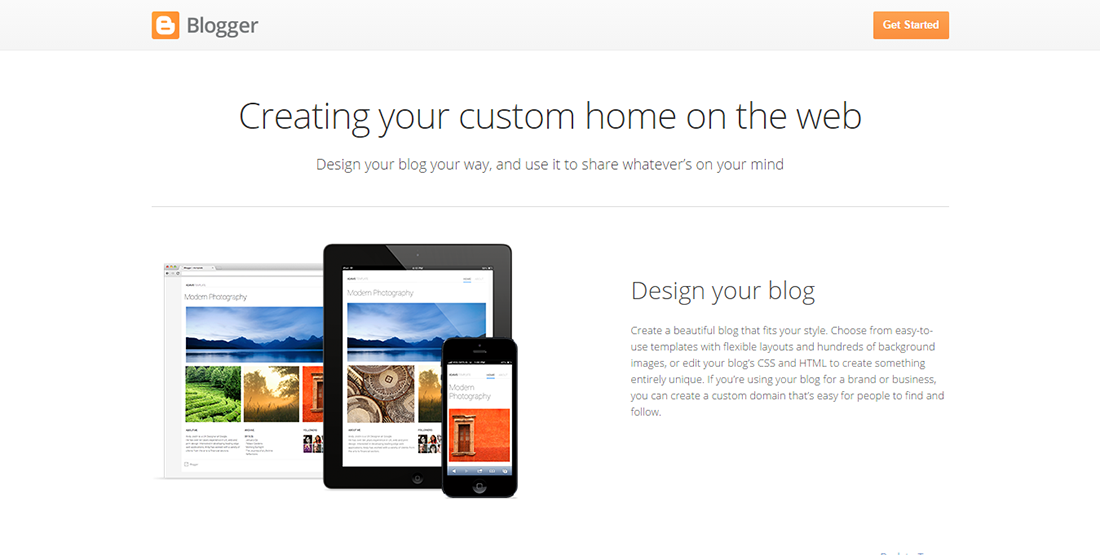
Blogger is a blogging platform from Google, with all the organization’s advantages backing it. Blogger is multilingual and you can access it from mobile devices as well.
Many beautiful templates are available to pick from and use, with or without customization. You can even modify it using CSS and HTML to make it appear distinctive. There are many great ready-made Blogger templates available. And if you are using it for your business, you can create a custom domain.
The developers integrated Google AdSense to your Blogging account so you can develop your blog into an income generating venture.
Blogger was the #1 WordPress alternative before it was acquired by Alphabet (Google). However, development for it has stalled and the results show.
11. Expression Engine
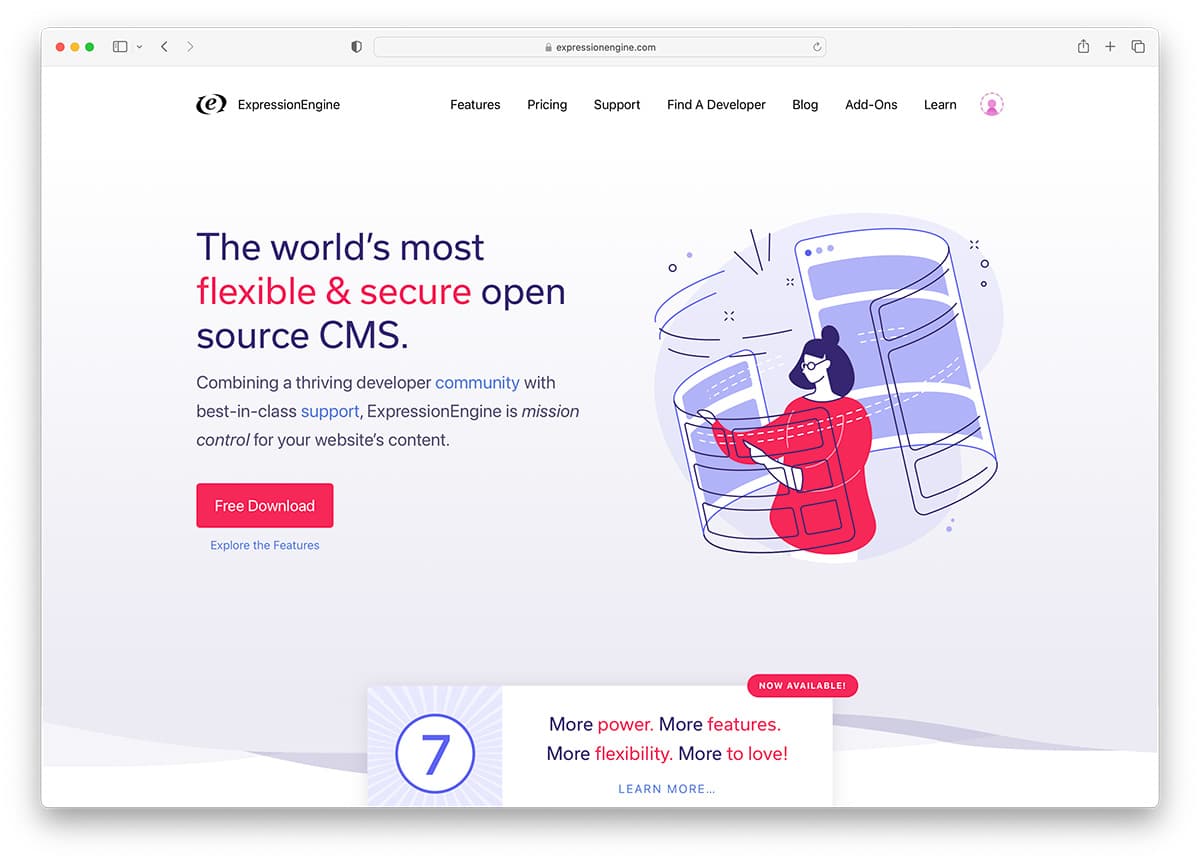
Expression Engine is not for newbies or anyone who does not want to handle code. It is a complex, powerful CMS intended for web developers. It is a PHP and MySQL-based secure platform. Several add-ons from third parties are available, and creating add-ons at all levels is easy and helps a great deal in customization. After rendering it in HTML, you can use themes for other platforms for Expression Engine.
Expression Engine also offers a free version, Expression Engine Core, a limited feature option. Individuals can only use it for non-commercial purposes. You must also display the credit to the CMS on the website. The paid service comes at $299 and you can use it to license a single live site. Support is also available, but only on a monthly subscription.
12. Shopify (eCommerce)

If it is an online store that you want, Shopify is a great alternative to WordPress. It has all the tools you need to set up shop quickly, with ready-made templates and apps. You can modify the design of your templates a good deal using HTML and CSS.
Shopify is not a free platform, although there are many packages you can buy and use according to the size of your store. A Lite version comes at $9 per month, and allows you to sell via your Facebook page. Big businesses may find Enterprise Shopify Plus more apt for their needs.
13. vBulletin (Forum and Community Platform)
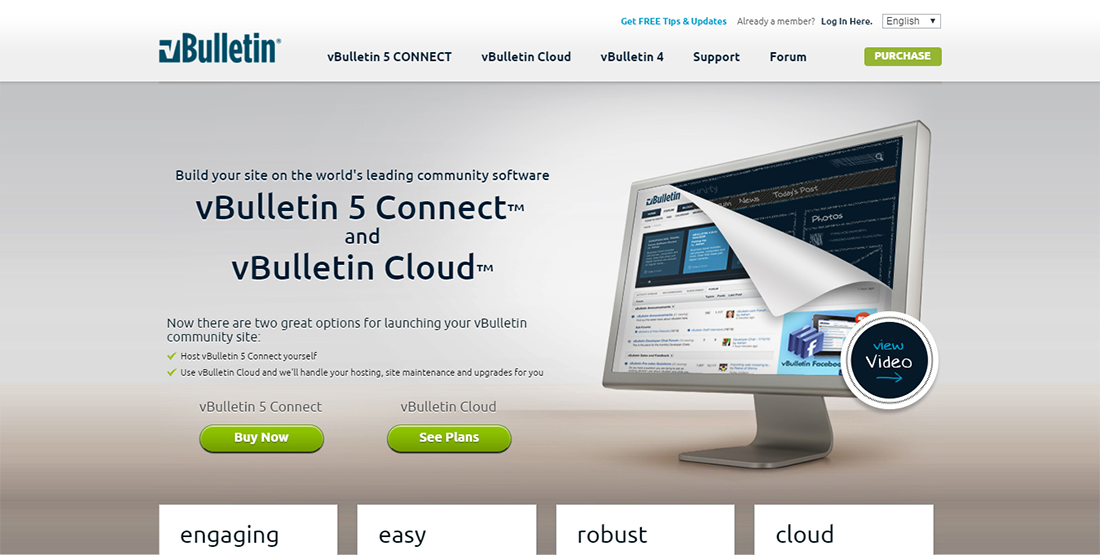
To create tons of content with contribution from a wide community base, vBulletin would be an ideal choice. You can easily create, customize, and launch a site on this platform. It is also secure and the moderation control is excellent.
Furthermore, you can set up limitless hierarchies of forums, even private ones. Moreover, you can modify features like posts, threads, user, user groups, registration options, member profiles, attachments, polls, etc.
You can purchase the license for $249.
14. Statamic
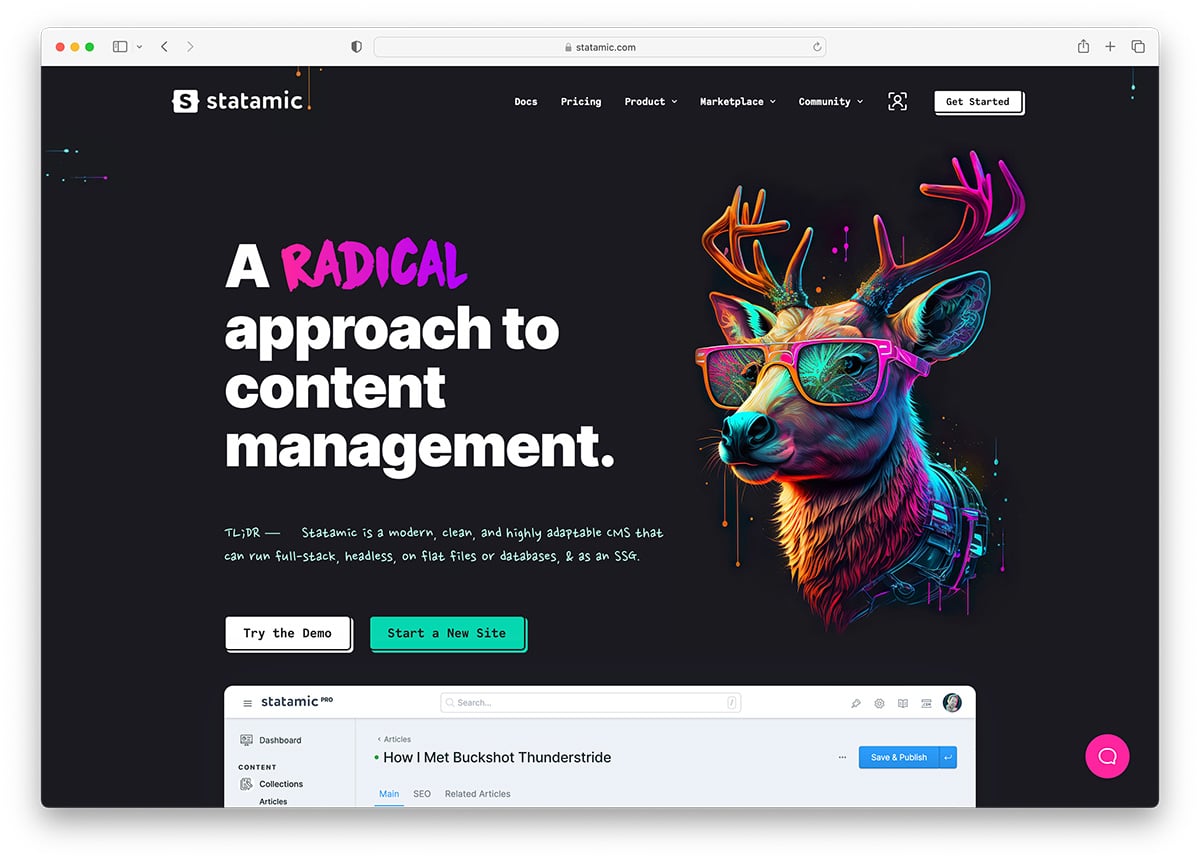
Statamic CMS is built with PHP. This CMS can also reduce your website building tasks to simply putting a few tags in your HTML. Additionally, it is a flat-file CMS, with the files carrying content in a simple directory structure. This CMS does away with a database. There is no database search in the serving and calling of files. This is also the same with WordPress meaning it will not cause your site to slow down.
Moreover, you can incorporate the themes and extend their functions. With the prerequisite being only PHP, it can run on any server. For use on a single personal website, you must buy a license that costs $29. For a Professional license, $99 is the cost of license.
Which is the best alternative to WordPress CMS?
Now, which one is the right CMS for you? While there is no hard and fast rule, beginners can pick Jimdo and Weebly. Squarespace is also ideal for users needing advanced features without changing them too much.
For ready-made online shopping platforms, Shopify and Magento are good choices. For developers, Expression Engine, Jekyll, and maybe Drupal. Community platforms should also look at vBulletin.
Of course, keep in mind that WordPress is always there for everyone – free, versatile, flexible, customizable, updated, and good developer and community support. It may take a little time to familiarize yourself with it.
Was this article helpful?
YesNo